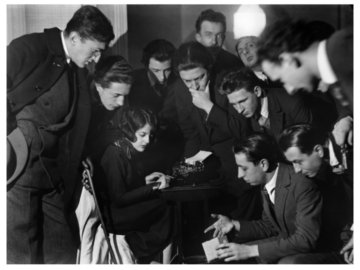Kaegan Sparks at Artforum:
 Ultimately, Surrealist Sabotage presents anti-work aesthetics as a fascinating and enduring thematic in Surrealist production, yet the political stakes of this thematic remain elusive. One reason lies in the book’s tendency toward diffuse and evenhanded treatment of wide-ranging source materials, at times deflecting important nuances and contradictions among and within them. Historical tensions internal to Surrealism are sidelined, including political disagreements between Breton and other interwar Surrealist-communists like Aragon and Bataille (the latter once colorfully denounced Breton’s camp as “too many fucking idealists”). Moreover, the complexities of Soviet art’s evolving orientation toward labor—inextricable, at the time, from the unprecedented challenge of transitioning to a classless society, despite economic underdevelopment and imperialist incursions—are all but elided. Socialist art becomes something of a straw man, reduced to a wholesale celebration of labor for labor’s sake. Nevertheless, Susik succeeds in eliciting tantalizing frictions around the relation of avant-garde movements to leftist politics in her study of the Surrealists’ attempts to “reconcile their revolution of the mind with the Marxist call for a proletarian overthrow.”
Ultimately, Surrealist Sabotage presents anti-work aesthetics as a fascinating and enduring thematic in Surrealist production, yet the political stakes of this thematic remain elusive. One reason lies in the book’s tendency toward diffuse and evenhanded treatment of wide-ranging source materials, at times deflecting important nuances and contradictions among and within them. Historical tensions internal to Surrealism are sidelined, including political disagreements between Breton and other interwar Surrealist-communists like Aragon and Bataille (the latter once colorfully denounced Breton’s camp as “too many fucking idealists”). Moreover, the complexities of Soviet art’s evolving orientation toward labor—inextricable, at the time, from the unprecedented challenge of transitioning to a classless society, despite economic underdevelopment and imperialist incursions—are all but elided. Socialist art becomes something of a straw man, reduced to a wholesale celebration of labor for labor’s sake. Nevertheless, Susik succeeds in eliciting tantalizing frictions around the relation of avant-garde movements to leftist politics in her study of the Surrealists’ attempts to “reconcile their revolution of the mind with the Marxist call for a proletarian overthrow.”
more here.
